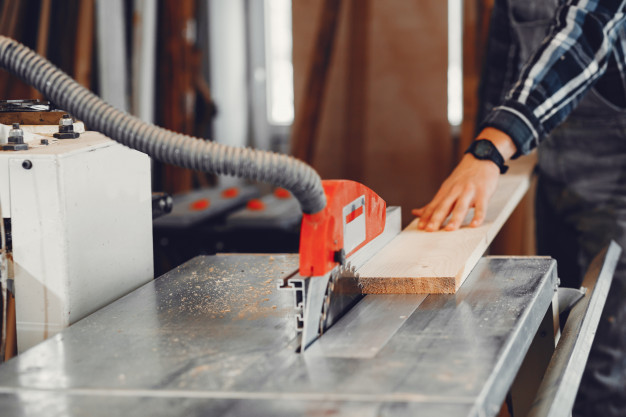A wood jointer is a power tool that is being used by wood craftsmen in shaping their workpieces. It is one of the most necessary pieces of equipment in a wood workshop.
This is very effective in getting your wood prepped. Raw woods come in rough lumbers and oversized. This electric machine shapes them evenly in minutes and they’re ready to cut.
There are different types of jointers available and they all have different kinds of projects. Each of them provides different results depending on your needs. Your wood pieces will get shaped more accurately with jointers than without them.
Let’s look into the most used jointers used by furniture craftsmen¦
Closed Stand Jointers: This is one of the most usual jointers available on the market nowadays. This type of jointers come in 4 different sizes such as 6, 8, 12 16 inches. They have a protective base that keeps its motor safe and saves this from dust. This also helps in decreasing the noise made by the motor while cutting woods. Though it makes the jointer heavier, it increases its stability and safety. This is the reason why this is the most popular jointer.

Open Stand Jointers: These jointers doesn’t come with an enclosed base unlike a close stand jointer. This makes it super lightweight and portable which allows you to carry it easily. Having these kinds of jointers at your workshop can be amazingly handy if you prefer framing as well as stud work a lot.
However, these aren’t as solid as closed stand jointers. They are very loud and noisy which can be very irritating. Another disadvantage is its vibration. They vibrate very strongly as they are very light in weight.
Benchtop Jointers: This type of jointers are the smaller versions of table jointers. This is useful if you are working on smaller projects. But you won’t like to have it if you want something solid and larger. It’s still very popular amongst some craftsmen for how portable it is. It can be carried easily anywhere and anytime like an open stand jointer. Because their maximum capacity of cutting is only 6 inches wide, it can be quite challenging when cutting larger wood pieces.
Drilly experts recommend some benchtop jointers Don’t forget to take a look.
Tabletop Jointers: Tabletop jointers can be the best thing in heavy flattening of woods. This is the bigger version of benchtop jointers. Benchtop jointers are easily portable while tabletop jointers are not.
However, a tabletop jointer is easy to not only flatten thicker but also in cutting larger and wider pieces of wood. It will help you to complete your work faster.
Wood Planers: Wood planers are a tool that works on wood surfaces to flatten the thickness and make the surface smooth. It’s a prepping task of woods before they are taken for varnishing or painting. It is a must have tool for almost all your projects. Hence, it is very popular in wood workshops. They can be both hand and power operated. Hand operated planers are slower while power operated planers are faster and easier to work with.
There are plenty of variations of planers available on the market. They all have their own specific features and are used in different types of projects. They are great in improving carpenters and wood furniture makers crafts. A big furniture shop needs a lot of planers to make their workpieces perfect.
Safety Tips
A jointer can be proved dangerous to you and your workpiece if you don’t know how to use it. If you never handled a jointer but now you need to take help from one then read the safety tips below. These will keep you safe while working with jointers.
- Â protective glasses: While working with jointers, your workplace gets full of flying dust and debris. If you don’t wear protective googles, these might get into your eyes very often. This will hamper your work process and also harm your eyes.
- Â Hearing Protection: Putting on hearing protection will protect your ears from those creepy noises come from jointer motor. This can harm your hearing in a long term if you don’t protect your ears while using these machines.
- Hand Protection: Going empty handed when using jointers can be very risky. The blades of jointers are very sharp and a little bit of carelessness can make you suffer a lot. Make sure to put on hand protective equipment to avoid any accidents.
Conclusion: There are plenty of jointers are available nowadays. Some are affordable while the others are very expensive. Choose a jointer according to your needs. You don’t have to buy very expensive jointers; some affordable jointers would do your job just as good as an expensive one.

















































